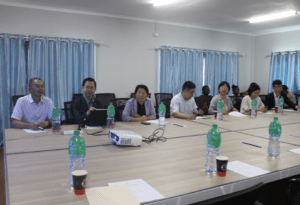BY CHRIS ALEX
HON. Trevor Manemahaga, the Minister for Environment, Climate Change, Disaster Management, and Meteorology, has reminded Parliament on the need for balanced infrastructure and economic development in the country.
Minister Manemahaga, in line with the Prime Minister’s sentiments, is advocating for a development agenda that balances economic growth with environmental protection.
“Our national quest for infrastructure and economic development must be undertaken in a balanced manner,” he stressed. “The Solomon Islands’ economy is heavily dependent on a narrow natural resource base, making it critical that this resource is not exploited at the expense of future generations.”
He urged the nation to embrace environmental stewardship, promote community engagement, and prioritize genuine investment that balances productivity with sustainability.
“Our natural environment remains our basic source of sustenance,” the Minister stated, highlighting the importance of protecting the nation’s biodiversity and natural resources.
Before addressing his ministry’s efforts, Hon. Manemahaga provided an overview of the broader economic context, reflecting on the challenges the country has faced over the last two decades. He acknowledged the strain on the economy, which has struggled to keep pace with population growth. However, he cautioned against assigning blame solely to government policy, noting that external shocks such as the ethnic crisis, natural disasters, the health pandemic, and riots have severely impacted the nation’s economy.
“These events cause major shocks to the economy and are pushing us closer to recession,” he explained.
Manemahaga recognized the leadership of previous governments in steering the country through these hard times, but he also called attention to the long-standing structural challenges inherited from previous decades. In particular, he criticized the Structural Adjustment Programs of the 1980s, which led to the privatization of state-owned enterprises and weakened essential industries, including transportation.
“These reforms did not fit the dynamics of our economy,” he said, illustrating how policies designed for developed nations were forced upon the Solomon Islands with little regard for its unique circumstances.
A significant portion of the Minister’s address was dedicated to the role of multilateral and bilateral development partners. While their contributions have been vital, Manemahaga urged these partners to reconsider their strategic approach. He questioned the disproportionate focus on urban centers and low-return sectors, suggesting that their assistance must be country-driven and focused on economic growth rather than geopolitical interests.
“This is an important question in our pursuit to transform this economy,” he highlighted, adding that development support should align with the Solomon Islands’ long-term goals.
Hon. Manemahaga acknowledged the heavy reliance on fiscal policy to tackle the nation’s economic woes but stressed the need for a more comprehensive policy framework. He pointed out that while fiscal measures are critical, they are not the only solution. Both monetary policy and financial sector reform need to play a greater role in driving economic growth.
A key issue highlighted by the Minister is the lack of capital finance available to the private sector. Banks in the Solomon Islands, he said, are reluctant to lend due to perceived risks, preferring instead to profit from low-risk activities such as foreign exchange trading. This hesitation stifles private sector growth, which is vital to economic recovery.
“If the monetary policy tools used by the central bank are not working, then use other measures to support our economy,” he urged. He called for an increase in private-sector lending, stressing the importance of unlocking liquidity in the financial system to stimulate growth.




